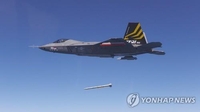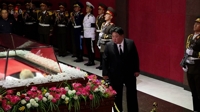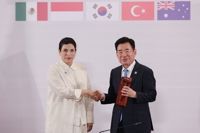#Korean history
Today in Korean History
-
-
Today in Korean history
March 5 1920 -- The Chosun Ilbo begins publication. The newspaper later became one of the most popular dailies in South Korea. 1946 -- Socialist authorities governing the northern part of Korea announce a land reform law. The leadership, established one month earlier and tentatively named ... 14:00 Mar. 04 -
#Today in Korean history
Today in Korean history
March 4 1866 -- Bishop Simeon Francois Berneux, who arrived in Korea in 1851 to become its fourth bishop, is executed as part of a larger persecution of Western missionaries and their converts by Korea's rulers. The persecution, which lasted until 1871 and claimed the lives of some 8,000 Kore... 14:00 Mar. 03 -
#Today in Korean history
Today in Korean history
March 3 1949 -- South Korea establishes diplomatic relations with the Philippines. 1956 -- South Korea launches the Korea Stock Exchange, the country's first stock market operator for the main bourse. 1973 -- The Korean Broadcasting System (KBS), a state-run television and radio netwo... 14:00 Mar. 02 -
Today in Korean history
March 2 1906 -- Hirobumi Ito assumes duties as Japan's first governor-general of Korea. 1959 -- South Korea establishes diplomatic ties with Norway. 1960 -- A large fire breaks out at a rubber factory in Busan, killing 62 people. 1994 -- The government reinstates 1,135 teachers fi... 14:00 Mar. 01 -
#Today in Korean history
Today in Korean history
March 1 1919 -- Millions of Koreans begin peaceful demonstrations nationwide, demanding independence from Japanese colonial rule. Thousands of Koreans were killed and tens of thousands were wounded when the Japanese military cracked down on the March 1 Independence Movement. 1943 -- Japan... 14:00 Feb. 29 -
Today in Korean history
Feb. 29 1952 -- South Korea signs an aviation accord with China. 1976 -- Hyundai Motor Co. releases the country's first car, the Pony. Hyundai Motor, established in 1967, is now South Korea's biggest automaker. 1980 -- Construction of Seoul's Line 3 and 4 subway lines begins. 200... 14:00 Feb. 28 -
#today history
Today in Korean history
Feb. 28 1948 -- Kim Koo, a Korean independence fighter and politician, publicly opposes the U.N.'s proposal to hold a separate general election in southern Korea. Kim said the election would lead to the division of the Korean Peninsula and that the communist-controlled northern Korea and the U... 14:00 Feb. 27 -
#Today in Korean history
Today in Korean history
Feb. 27 1948 -- The South Korean government issues a statement claiming jurisdiction over Dokdo, the islets located roughly halfway between South Korea and Japan. Japan had previously stated that it did not recognize South Korea's claim to the islets in the East Sea. 1959 -- Jo Bong-am, a S... 14:00 Feb. 26 -
#Today in Korean history
Today in Korean history
Feb. 26 1948 -- The United Nations decides to conduct general elections in what is now South Korea, giving up on plans to establish a single Korean government after a Soviet-backed regime took control of the northern part of the peninsula. 1982 -- The U.S. Air Force announces the deploymen... 14:00 Feb. 25 -
#Korean history
Today in Korean history
Feb. 25 1981 -- Chun Doo-hwan, a former Army general who staged a military coup in December 1979, is elected as South Korea's 12th president by the electoral college he handpicked. Chun's predecessor, Park Chung-hee, was assassinated by his intelligence chief. Chun ruled South Korea from 1981... 14:00 Feb. 24 -
#Korean history
Today in Korean history
Feb. 24 1961 -- South Korea and the Philippines sign a trade accord. 2007 -- South Korea and the United States announce that Seoul will reclaim wartime operational control of its forces from Washington on April 17, 2012. The agreement resolved one of the most controversial bilateral issue... 14:00 Feb. 23 -
#Korean history
Today in Korean history
Feb. 23 1904 -- The Korea-Japan Protocol is signed. The agreement imposed by Japan states that the Korean government must accept Japanese recommendations on the modernization of its facilities and provide strategic bases for Japanese troops if a third country invades Korea. On the pretext of ... 14:00 Feb. 22 -
#today history
Today in Korean history
Feb. 22 1980 -- The South Korean government decides to boycott the Moscow Olympics, following the United States, West Germany, Japan and Canada. 1990 -- The Cabinet adopts a bill to create a fund for inter-Korean cooperation, one of the legal systems for supporting economic and social exc... 14:00 Feb. 21 -
#today in Korean history
Today in Korean history
Feb. 21 1954 -- A vessel from South Korea carrying North Korean prisoners of war arrives in India. The group of 76 prisoners, who were held by southern authorities during the 1950-1953 Korean War, wanted to live somewhere other than Korea after their release. North Korean POWs in the South we... 14:00 Feb. 20 -
#Korean history
Today in Korean history
Feb. 20 1920 -- The Korean Aviation School opens in Willows, California. Established by a group of Korean independence activists, the school produced pilots who fought against the Japanese colonial regime that ruled the country from 1910 to 1945. 1963 -- Students from the nation's first R... 14:00 Feb. 19 -
#Today in Korean history
Today in Korean history
Feb. 19 1136 -- An uprising led by Myocheong, a Buddhist monk and royal adviser during the Goryeo Dynasty (918-1392), is killed by the king's army. Myocheong, who supported an independent policy toward China and opposed conservative officials, suggested war against the Chinese kingdom and wan... 14:00 Feb. 18 -
Today in Korean history
Feb. 18 1909 -- The Korean Empire, the successor of the Joseon Dynasty lasting from 1897 to 1910, announces national tax collection laws. Regional tax laws were formed three years earlier, yielding part of the tax income to local municipalities. 1910 -- The first commercial movie theater op... 14:00 Feb. 17 -
#Korean history
Today in Korean history
Feb. 17 1962 -- The government finalizes its five-year economic development plan for the nation's economy, still reeling from the effects of Japanese colonization and the Korean War. Economic revitalization was carried out through four five-year plans over 20 years until 1982, eventually achi... 14:00 Feb. 16 -
#Today in Korean history
Today in Korean history
Feb. 16 1942 -- North Korean leader Kim Jong-il is born. He took power after his father Kim Il-sung, founder of the communist country, died in 1994. 1945 -- Poet Yoon Dong-ju dies in a prison in Japan at the age of 29. Born in Manchuria, northeastern China, he studied in Pyongyang and Seo... 14:00 Feb. 15
-
 BTS' RM to prerelease 'Come Back to Me,' music video directed by Lee Jung-jin of 'Beef'
BTS' RM to prerelease 'Come Back to Me,' music video directed by Lee Jung-jin of 'Beef' -
 (Yonhap Interview) Ex-Pentagon official stresses need for war plan rethink, swift OPCON transfer, USFK overhaul
(Yonhap Interview) Ex-Pentagon official stresses need for war plan rethink, swift OPCON transfer, USFK overhaul -
 Top S. Korean envoy to Russia attends Putin's inauguration ceremony: Seoul official
Top S. Korean envoy to Russia attends Putin's inauguration ceremony: Seoul official -
 Foreign medical license holders to practice medicine in S. Korea amid prolonged doctors' walkout
Foreign medical license holders to practice medicine in S. Korea amid prolonged doctors' walkout -
 KF-21 fighter jet prototype to conduct 1st Meteor missile test
KF-21 fighter jet prototype to conduct 1st Meteor missile test








